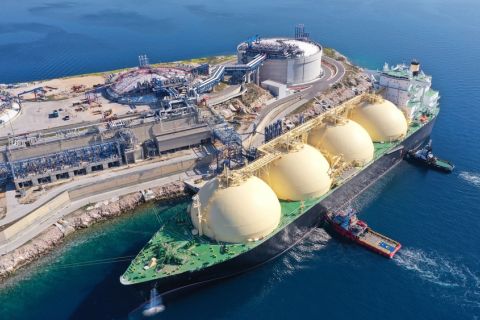Shale gas developer Cuadrilla will start fracking at its Preston New Road site in northwest England in the next few weeks, it said on Sept. 19 as it announced government approval for a second well.
Hydraulically fracturing, or fracking, involves extracting gas from rocks by breaking them up with water and chemicals at high pressure and was halted in Britain seven years ago after causing earth tremors.
But the British government, keen to cut its reliance on imports as North Sea supplies dry up, has tightened regulation of the industry and gave consent in July for Cuadrilla to start fracking a first well at Preston New Road.
After approval for a second well at the site, Cuadrilla said on Sept. 19 that it would begin work “in readiness to start hydraulically fracturing both wells in the next few weeks”.
Cuadrilla said it would run an initial flow test of the gas produced from both wells for approximately six months.
The British Geological Survey estimates shale gas resources in northern England alone could amount to 1,300 trillion cubic feet of gas, 10% of which could meet the country’s demand for almost 40 years.
However, attempts to extract the gas have come under fire from local communities and campaigners concerned about the potential effect on the environment and ground water, and arguing that extracting more fossil fuel is at odds with the country’s commitment to reducing greenhouse gas emissions.
British energy and clean growth minister Claire Perry said consent for the second well had been granted after the company had met a number of criteria, including showing it had the necessary funds to carry out work at the site until at least June 30, 2019.
“Shale gas has the potential to be a new domestic energy source, further enhancing our energy security and helping us with our continued transition to a lower-carbon economy,” she said in an emailed statement.
Cuadrilla first attempted to frack gas near Blackpool in the northwest of England in 2011, but the practice led to an earth tremor registering 2.3 on the Richter scale.
The company said the quakes were caused by an unusual combination of geological features at the site, but they led to an 18-month nationwide ban on fracking while further research was carried out.
The government has since introduced a traffic-light system that immediately suspends work if seismic activity of 0.5 or above on the Richter scale is detected. It has also increased monitoring standards, including checks on ground water.
Fracking consent was introduced in 2015 as an additional step to the government’s regulatory regime and ensures environmental, health and safety permits have been obtained.
“Our world class regulations will ensure that shale exploration will maintain robust environmental standards and meet the expectations of local communities,” Perry said.
Recommended Reading
Utah’s Ute Tribe Demands FTC Allow XCL-Altamont Deal
2024-04-24 - More than 90% of the Utah Ute tribe’s income is from energy development on its 4.5-million-acre reservation and the tribe says XCL Resources’ bid to buy Altamont Energy shouldn’t be blocked.
US Interior Department Releases Offshore Wind Lease Schedule
2024-04-24 - The U.S. Interior Department’s schedule includes up to a dozen lease sales through 2028 for offshore wind, compared to three for oil and gas lease sales through 2029.
CEO: Linde Not Affected by Latest US Green Subsidies Package Updates
2024-02-07 - Linde CEO Sanjiv Lamba on Feb. 6 said recent updates to U.S. Inflation Reduction Act subsidies for clean energy projects will not affect the company's current projects in the United States.
Global Energy Watch: Corpus Christi Earns Designation as America's Top Energy Port
2024-02-06 - The Port of Corpus Christi began operations in 1926. Strategically located near major Texas oil and gas production, the port is now the U.S.’ largest energy export gateway, with the Permian Basin in particular a key beneficiary.
The Problem with the Pause: US LNG Trade Gets Political
2024-02-13 - Industry leaders worry that the DOE’s suspension of approvals for LNG projects will persuade global customers to seek other suppliers, wreaking havoc on energy security.




